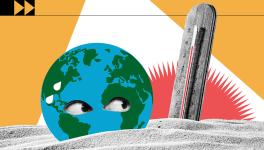Indians 15% More Vulnerable to Extreme Heat: Lancet Study

Representational Image. Image Courtesy: The New Indian Express
Indians have become 15% more vulnerable to the extremes of heat than in 1990 with 3,45,000 people in the 65-year-plus bracket dying globally due to heat-related causes in 2019—80.6% higher than in the 2000-05 average. These figures were revealed in The 2021 report of the Lancet Countdown on health and climate change: code red for a healthy future, released on Thursday.
Between 2018 and 2019, India and Brazil had the biggest absolute increase in heat-related mortality, the report, released by the medical journal The Lancet, showed with India being one of the five countries—the others being China, Egypt, Indonesia and Nigeria—whose vulnerable populations had the most exposure to extreme heat over the past five years.
Measuring the vulnerability to heat stress in a range of 0 to 100, the report found that India recorded 31 on the index, 15% higher than the level recorded in the 1990s.
Low- and middle-income countries and vulnerable communities, including children, older populations, socio-economically poor communities, and those with underlying health problems are most at risk from climate change, the report highlighted.
“Climate change is here and we’re already seeing it damaging human health across the world,” Anthony Costello, executive director, Lancet Countdown, said in a statement. “As the COVID-19 crisis continues, every country is facing some aspect of the climate crisis too. The 2021 report shows that populations of 134 countries have experienced an increase in exposure to wildfires. Millions of farmers and construction workers could have lost income because on some days it’s just too hot for them to work. Drought is more widespread than ever before.”
According to the report, with a “world facing an unavoidable temperature rise, even with the most ambitious climate change mitigation, accelerated adaptation is essential to reduce the vulnerabilities of populations to climate change and protect the health of people around the world”.
The report highlighted how wealth inequalities affect the number of heat-related deaths. In the absence of air conditioning, an estimated 1,95,400 more heat-related deaths would have occurred globally among people aged 65 years and older in 2019.
In this age group, air conditioning averted an estimated 69,500 deaths in China (where 72,000 deaths attributable to heat exposure are estimated to have occurred in 2019 and 65% of households had air conditioning), 47,800 in the USA (where 20,500 deaths are estimated to have occurred and 92% of households had air conditioning), 30,400 in Japan (where 12,400 deaths are estimated to have occurred and 93% of households had air conditioning), but only 2,400 in India (where 46,600 deaths are estimated to have occurred and 6% of households had air conditioning).
“These figures show the power of indoor cooling to prevent death and the inequities in access to indoor cooling across countries,” the report stated. However, it also pointed out that current air conditioning technology is unsustainable and leads to adverse health outcomes from increased air pollution, urban heat and greenhouse gas emissions.
Globally, in 2017-20, there was an average of 2,15,531 more person-days of wildfire exposure than in 2001–04. Overall, 134 (72.4%) of 185 countries had an increase in wildfire exposure in 2017-20 compared to 2001-04. The largest increases in wild-fire exposure were observed in the Democratic Republic of the Congo, India, and China.
The increased exposure to extreme heat also impacted the productivity of workers with the loss of 295 billion hours of potential work globally in 2020. Pakistan, Bangladesh and India, the three most populous countries in the medium- Human Development Index (HDI) group, reported 2.5-3 times more loss of work hours than the world average, the report stated. India, Pakistan, and Bangladesh lost 216-261 hours of potential work per employed person against the moderate global average of 88 work hours.
The Lancet Countdown is an international collaboration that independently monitors the health consequences of a changing climate. “The 44 indicators of this report expose an unabated rise in the health impacts of climate change and the current health consequences of the delayed and inconsistent response of countries around the globe—providing a clear imperative for accelerated action that puts the health of people and planet above all else,” the report stated.
The 2021 report coincides with the UN Framework Convention on Climate Change 26th Conference of the Parties, at which countries are facing pressure to realise the ambition of the Paris Agreement to keep the global average temperature rise to 1.5°C and to mobilise the financial resources required for all countries to have an effective climate response.
“These negotiations unfold in the context of the COVID-19 pandemic—a global health crisis that has claimed millions of lives, affected livelihoods and communities around the globe, exposed deep fissures and inequities in the world’s capacity to cope with and respond to health emergencies,” the report stated.
Get the latest reports & analysis with people's perspective on Protests, movements & deep analytical videos, discussions of the current affairs in your Telegram app. Subscribe to NewsClick's Telegram channel & get Real-Time updates on stories, as they get published on our website.
























